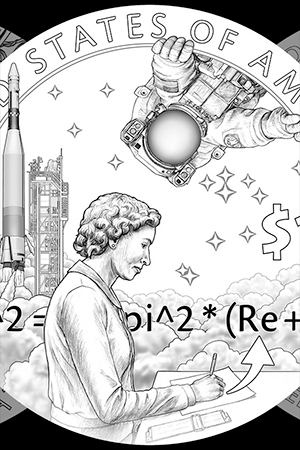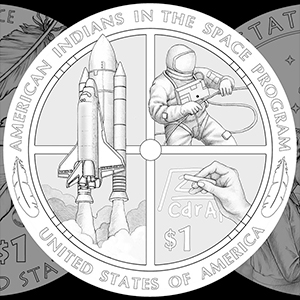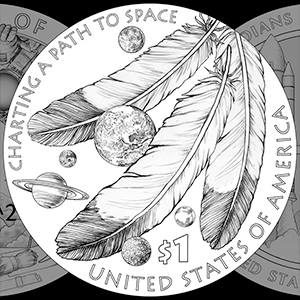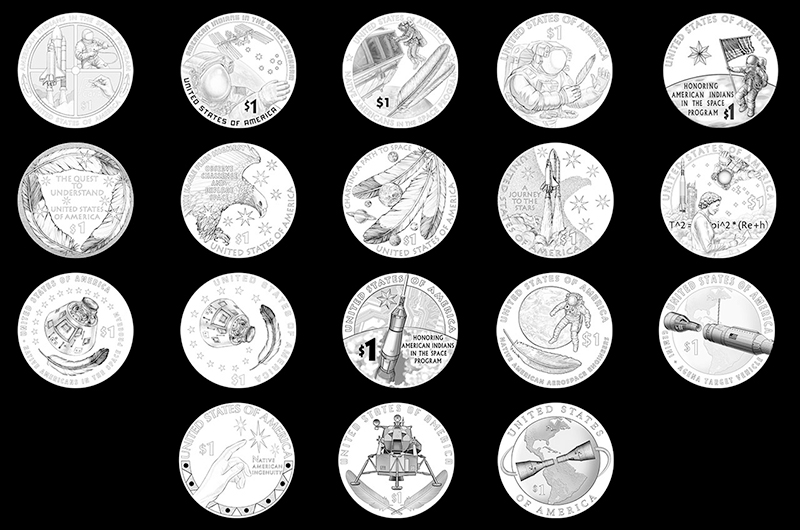 advertisements advertisements
|

|
American Indians in the space program to be honored on 2019 $1 coin
June 21, 2017 — The United States Mint will recognize the important roles that Native Americans have held within the U.S. space program with the release of a dollar coin in 2019.
Continuing an annual series begun in 2009, the U.S. Mint's Native American $1 coin continues the use of a portrait of Sacagawea on its heads side, and features a design on its reverse (or tails side) that changes every year to honor the contributions of American Indians or Indian tribes.
For 2019, the Mint's chosen theme is "American Indians in the Space Program," complementing another set of coins being issued that year to commemorate 50 years since the Apollo 11 first moon landing.
"American Indians have been on the modern frontier of spaceflight since the beginning of NASA," April Stafford, director of the Mint's Office of Design Management, said at a Citizens Coinage Advisory Committee meeting, citing the description of the coin.
Among the individuals the coin serves to honor are:
Mary Golda Ross, of the Cherokee Nation, was the first female Native American engineer and her work for Lockheed Martin helped to advance the Agena rocket upper stage that supported rendezvous and docking trials during the Gemini program.
Jerry Elliott, of the Osage and Cherokee nations, calculated the spacecraft trajectory which enabled the return of the Apollo 13 crew to Earth, for which he and his fellow members of the Mission Control Center received the Presidential Medal of Freedom.
John Herrington, of the Chickasaw Nation, who in 1996 became a NASA astronaut and who launched to the International Space Station aboard the space shuttle Endeavour as an STS-113 crew member in 2002. During the 14-day flight, he performed three spacewalks, totaling more than 19 hours.
The Mint's sculptor-engravers and members of the Artistic Infusion Program (AIP) developed a portfolio of 18 designs for the tails side of the coin.
The concepts range from depicting the space shuttle and International Space Station, Apollo command module and lunar module, and a Gemini spacecraft with Agena target vehicle, as nods to Herrington, Elliott and Ross. One of the designs includes a portrait of Ross and several represent Herrington as a spacesuited astronaut.
The designs also incorporate American Indian symbology, including the Cherokee seven-pointed star, the eagle and the Pleiades star cluster, which holds special significance in Native American folklore. The designs also incorporate feathers, as both a symbol of the tribes and a reference to Herrington flying an eagle feather to space.
"The feather is extremely important to the American Indian community and so I think that all of these designs are quite good, but I would love to see a feather in whatever design we accept," said Doug Herman, senior geographer at the Smithsonian's National Museum of the American Indian, who advised the Mint on the coin, at a CCAC meeting on Wednesday (June 21).
The CCAC and Commission of Fine Arts (CFA) reviewed the designs, as did the relevant Indian affairs committees in the House of Representatives and Senate.
The House preferred a design that included a launching space shuttle, Gemini astronaut and a hand writing out an equation (symbolic of calculating a trajectory), as well as two feathers in its border. The CFA and Senate, as well as the National Museum of the American Indian, preferred a design with a portrait of Ross, as well as a launching Atlas-Agena and an astronaut depicted floating upside down (in relation to the artwork's other elements). That design also includes the Pleiades cluster.
The CFA recommended a design with three large feathers, representing the tribes of the honorees, together with five planets of our solar system, including Earth with its moon. The CFA suggested changing the legend "Charting A Path Into Space" to "American Indians In The Space Program," or a similar statement of the coin's theme.
"I was drawn really to the symbolism of the feather," said Kareem Abdul-Jabbar, the former professional basketball player who was sworn in as a CCAC member Wednesday.
The Mint will next compile the recommendations from all of the reviews and present them with the design portfolio to the Secretary of the U.S. Treasury, who will select the final design.
Golden in color, the Native American $1 coins are minted as collectibles, but can be used as a legal tender. |
|

Native Americans in the U.S. space program, such as Mary Golda Ross depicted on the proposed design above, will be honored in 2019 on a United States dollar coin. (U.S. Mint)

One of 18 proposed designs for the 2019 Native American $1 coin, as preferred by the Congressional Native American Caucus of the House of Representatives. (U.S. Mint)

One of 18 proposed designs for the 2019 Native American $1 coin, as favored by the Citizens Coinage Advisory Committee. (US Mint) |

The 18 designs for the reverse, or tails side, of the U.S. Mint's 2019 Native American $1 coin. (U.S. Mint) |
|

© 1999-2025 collectSPACE. All rights reserved.
|
|

|

|
